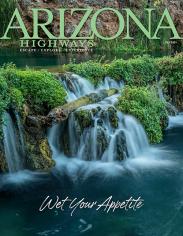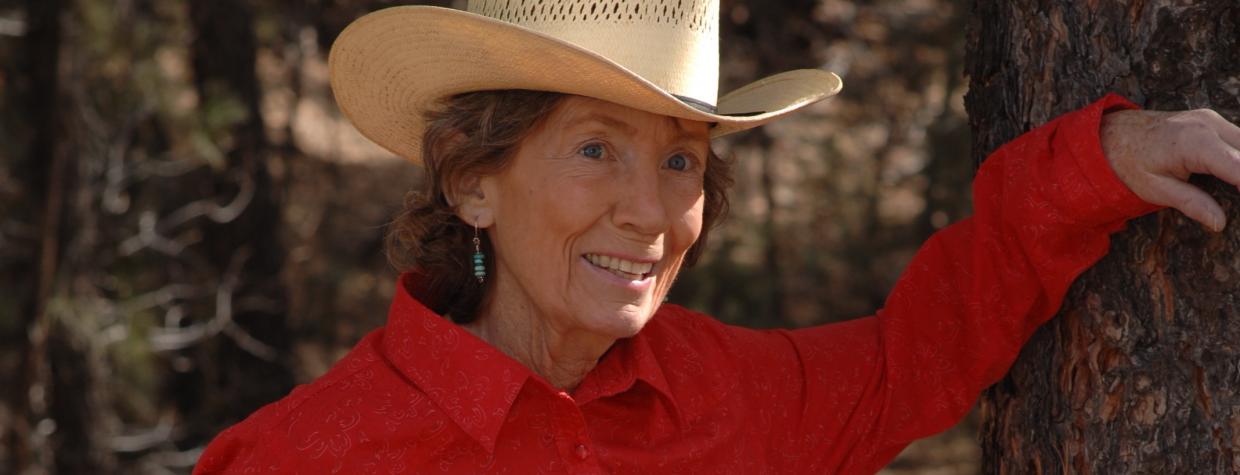Jo Baeza, a gifted and prolific writer whose descriptions of Arizona life endeared her to readers of Arizona Highways and other publications, died November 16 at her home in Pinetop-Lakeside. She was 87.
A cause of death was not specified, but Baeza's obituary in the White Mountain Independent, where she wrote a regular column, noted that she battled scleroderma, a progressive autoimmune disease, in recent years.
Born Joan Johnson, she was a Minnesota native and member of a family that helped settle that territory in the 1800s. She then settled in the Holbrook area after graduating from Stanford University in 1954; before long, she was writing for Arizona Highways. Her first story for the magazine was The Hash Knife Outfit, published in June 1956 under her maiden name. Sketches by Ross Santee accompanied the story, and the opening paragraph typified Baeza's plain-spoken, yet vivid writing style:
There were bigger cattle companies in North America. There was the XIT ranch in the Texas panhandle, and the gigantic Terrazas spread in Chihuahua, Mexico. But big or small, none will be remembered longer than the old Hash Knife outfit of the 1880s and 1890s, whose infamy has been spread in campfire legends throughout the West. It wasn't just the size of the property, nor its value, nor its gun-toting cowboys that earned the outfit its reputation. What distinguished it from all other cattle companies in history was just where and when it flourished. It was a product of the times, and the Hash Knife brand is a symbol of that stormy period in northern Arizona.
At a 2013 gathering of Arizona Highways "old-timers," Baeza recalled, her 1956 story was the subject of a good-natured debate with former editor Don Dedera over which of them had been first to contribute to the magazine. "I retain the title of 'Oldest Living Contributor,'" she concluded, "until an older contributor comes along, which seems unlikely at this time."
Also in 1956, she married cattleman Cooney Jeffers, and her time living with him on a ranch south of Holbrook inspired her 1964 book, Ranch Wife. Later works included 2011's Eagles at Noon, a collection of poetry, and 2012's Arizona: The Making of a State, timed to coincide with the state's centennial.
The couple divorced in 1965, and she moved to Pinetop-Lakeside, where she resided until her death. After an eight-year marriage to Western author J.P.S. Brown (another Arizona Highways contributor), she was married to horse trainer Luis Mario Baeza for six years before the marriage ended amicably.
Baeza's writing won her fans among generations of readers of Arizona Highways and the White Mountain Independent, for which she began writing in 1981. Her most recent work for the newspaper came in September, when she marked the passing of Senator John McCain.
Arizona Highways has published numerous stories by Baeza, most recently Not So Lonely, which originally ran in the magazine in 1967. It's a look at what it took to be a fire lookout in the White Mountains:
A lookout's days are long and confining, but different, every one. He notices cloud patterns, birds' songs, light and shade playing in the green forest. He smells dry, dusty leaves; brittle, cold morning air; moist pine needles; and sweet, wet oak leaves. A lightning storm charges the air with sharp purity. Rain on Arizona's red soil is sour and mineral. Always in the air is the clean, sharp fragrance of the ponderosas. They stand with dignity and patience in their God-given places. You wait for July and August, when the clouds will swell and darken in the southeast and come rolling over Baldy to bring rain to the thirsty land. Then our peaceful mountains will be safe for another year.
Her most recent original work for the magazine, though, was in our special White Mountains issue in July 2017. In At Home in the Woods, she described some of the reasons the Eastern Arizona mountain range had become her longtime home:
Kids played outdoors until dark in summer. We had a big vegetable garden, chickens and turkeys, all of which had to be fed and watered. Kids learned to work and take care of animals. I'd put them up against anybody for their fish-cleaning speed. Not many kids today can actually go fishing after school for their supper. ... If kids had grievances, parents usually stayed out of it and let the kids settle their own fights. Teachers paddled boys for using naughty words. Nobody was rich, but nobody was hungry.
I can't say that life is better for kids in the White Mountains today than it was 50 years ago, but it is different. Today, kids have endless opportunities to learn, to grow, to be who they want to be. In the meantime, they get to wake up every morning to the same natural wonders that have been attracting good people since long before 1964.
A memorial service for Baeza will be held at 10 a.m. Thursday, November 29, at St. Mary of the Angels Parish in Pinetop-Lakeside. In lieu of flowers, donations can be made to the White Mountain Hospice Foundation, the Humane Society of the White Mountains or the National Forest Foundation.
Baeza's ashes will be interred at the Johnson family's plot in Minnesota.

